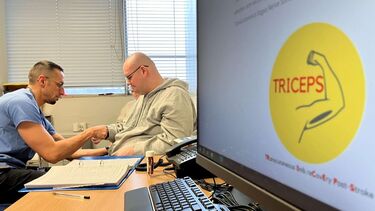Researchers at the University of Sheffield and Sheffield Teaching Hospitals NHS Foundation Trust are leading the trial Triceps, which is running in 19 NHS centres nationally.
The trial is open to anyone over the age of 18 living with arm and hand weakness whose stroke occurred between six months and ten years ago and who are not currently undergoing rehabilitation therapy – with just another 65 patients needed to complete recruitment.
Once complete, the £2m trial, which launched two years ago, could lead to the rollout of a new treatment which delivers electrical pulses to the brain during rehabilitation therapy, at cost and at scale.
The treatment known as transcutaneous (through the skin) vagus nerve stimulation (TVNS) involves stimulating a key nerve called the vagus nerve, using a wearable device which connects to a wired earpiece.
By pairing the treatment with a lightweight, portable pacemaker-like device, the trial aims to demonstrate that hand and arm weakness in stroke survivors can be improved whilst rehabilitation therapy is undertaken at home, providing convenience and easy access to patients.
Previous research using trans vagus nerve stimulation has shown huge promise. However, in these trials the electrical stimulator was surgically implanted in the chest to deliver the stimulation to damaged parts of the brain using vagus nerve stimulation
Triceps is one of the first non-invasive trials of its kind to see whether the treatment can improve hand and arm weakness in stroke survivors.
Around a third of stroke survivors suffer with permanent hand and arm weakness following a stroke, limiting their ability to carry out everyday activities.
Triceps was originally set up to recruit up to 243 patients. However, following an interim independent analysis of data, which has been reviewed by an external oversight committee this has been expanded to 270 patients – meaning even more patients across the country could benefit.
As Triceps is double blinded neither patients nor the researchers will know whether the treatment received or given is the TVNS or placebo whilst the trial is still active.
To date the trial has recruited 205 patients.
Professor Arshad Majid, Professor of Cerebrovascular Neurology at the University of Sheffield and Consultant Neurologist at Sheffield Teaching Hospitals NHS Foundation Trust and chief investigator of the trial said:
“We are incredibly pleased to have reached this important milestone in the TRICEPS study and conclusion of this phase of the study is now in sight, with only another 65 more people needed to reach our target and complete recruitment.
“Stroke is the leading cause of severe disability and can have a huge, long-lasting effect on someone’s life. This study offers real hope for people living with arm weakness after stroke, a highly disabling problem that affects independence, quality of life, and recovery for many stroke survivors. We’re really excited to be close to the final stages of this part of the study, as the sooner we finish recruiting; the sooner we can seek to make this promising new treatment more widely available to stroke survivors throughout the country.”
Participants will wear the device for one hour, five times a week during home stroke rehabilitation with support from community therapists. Some participants will also use the device during daily activities over 12 weeks.
The trial design and set up has been supported by the Sheffield Stroke and Aphasia Interest Group, who will continue to be involved throughout the running of the trial. It is also being supported by the NIHR Sheffield Biomedical Research Centre and NIHR Sheffield Clinical Research Facility.
To find out more about the trial, visit the Triceps website.

